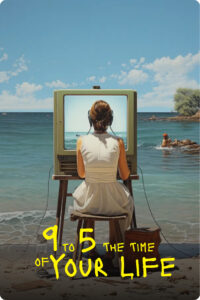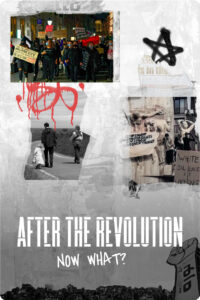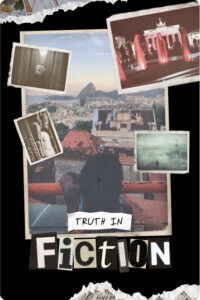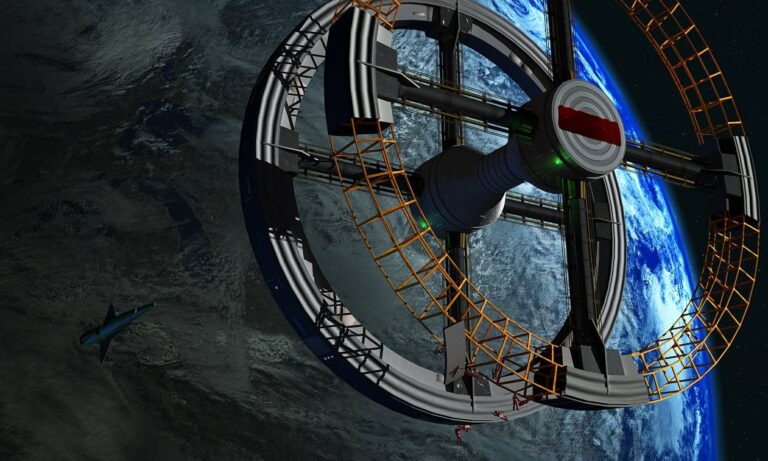I.
On a visit to New York in December 1964, Bryan Forbes called Stanley Kubrick to meet up on Park Avenue, at a close-by café just a couple of blocks down from Stanley’s apartment. Stan was surprised, but also grateful to hear Forbes’ voice. Actually, he needed his friend precisely at a moment like this. He wanted to try out this wild idea with him, a concept he had toyed with for some time already. His recently released film Dr. Strangelovecontained somehow a certain amount of fiction about the future of science. So the matter had been lingering on his mind for a while. But that day, he probably could express it in a resolute form for a person outside his immediate circle.
Where did this idea come from? Stanley had been a secret fan of space adventures from an early age, a passion that he shared with his wife, Christine. But to develop it into a film form was something else, a major step. Who knows, maybe it was the unconscious influence from the architecture surrounding him. After all, every known architect was now trying out these new styles, far away from the sleek Art Deco of the Empire State with its limestone and granite façade, and more into a new kind of materiality where glass and steel were overwhelmingly present, or onto those modular but spacious brutalist ensembles, where concrete was organized to shape incredible unearthly bodies.
Maybe it was all this sensationalism around the recent films of the soviet filmmakers. Take Pavel Klushantsev for instance. All the rush over his Planet of Tempeststwo years ago and that sort of thing. Although it was not screened in the US, there were rumors that Roger Corman was working on an American adaptation, and that even Peter Bogdanovich, very close to Orson Welles, was interested in making a similar project. What was it that attracted so many creative minds to these themes?
He was not sure, but it was a fresh territory to explore. That much he knew. And he was eager to test it now. He was thrilled that day and so we did not bother to put on a warm bonnet. On his way down the street, he felt the chill getting to his bones. So he stopped by at a drugstore and simply bought a fake-fur nylon cap to stand the icy wind for a while. It was his sort of mischief, now he could play out the whole pitch.
Forbes had come to the city to accompany the release of his latest film, Séance on a Wet Afternoon, which that was advertised as a thriller pushing the boundaries of the genre. Forbes had been starred by the studios as one of the upcoming promises of British Cinema. Both his debut, Whistle Down the Windfrom 1961 and his second film, The L-shaped Room released one year later, had been widely acclaimed. So he stood precisely at the ascent of a career where an author feels all the gates seem to open before him. Kubrick had felt this attitude already some years ago, in his judgmental comments around pretty much everything. He could even recall that plummy upper-class diction of his, which he surely nurtured during his time at the Royal Academy of Dramatic Art, where he had started as an actor. But Stanley was not wary. Actually, he did not like Forbes’ films, but he was a friend and he enjoyed watching his developments. He just thought he could let out his idea to see what would happen; Forbes would certainly see the idea with suspicion, but could he maybe add some cunning remarks too?
“Are you serious?” Forbes exclaimed, almost out of control. “Stan, science fiction is the standard for B-movies, you got to be kidding!” Kubrick observed his gestures, almost farcical shrugs of the kind you were too aware when the movies were silent. Then he nodded, as to let Forbes know he was actually exploring the possibility. “I’ve been looking at some books and ideas”, he said, quite dispassionately, also knowing there would be no need to add any further details, despite his previous enthusiasm. Their gazes crossed each other for a short while, and then both looked down to the sidewalk before them, each probably lost on a haze of incomprehension. Forbes did not dare ask further, but he felt he had to say something. The silence was awkward. So he looked down at Stanley’s phony hat with disgust, and said, as if it all were a matter of taste: “You know Stan, you really can’t walk around like that…” Stanley did not expect that twist but, as a matter of fact, it put all the tensions aside, so he went along with it. “You don’t like my flair? You really sound like my mother.”
sci-fi narratives were places of impatient developments that loosened up cosmic tensions without the need of diplomatic elegance or ideological significance
Shortly afterwards each parted towards their side of town. Stanley walked back to his apartment in Lexington and Eighty-Fourth Street with the answer he was looking for. He was not really disappointed, only sad to have this furious reaction from someone he had considered a close friend. In any case, this all made sense when arranged together. Unknowingly, he had the motif already, but not the purpose. Now he had the whole set. It just needed an excuse to come out. The puerile reaction from Forbes just gave that extra jolt to bring together all the scattered crumbs
Stanley had now some sense on how a general audience could react to his proposal, and that was even more the reason to do it. He had the opportunity to break the standards of an underestimated genre. Or so he thought. During the past years, while he was in England filming Lolita and Dr. Strangelove, he had been listening with sensation to different radio plays on the BBC. One of them, aired during several Friday evenings along November and December in 1961, had put him and Christine on the edge of the couch: Shadow on the Sun , written by an unknown author, Gavin Blakeney. Stanley was certain he could turn that sensation into an alluring sequence of images with a cinematic rhythm of their own. And although this definite leap had just been taken, he had worked substantially already on the steps to achieve it.
II.
Shadow on the Sun was a sci-fi thriller which did not enjoy a huge success, and was probably heard by its audience as a weekend amusement. In its plot, a meteorite hits the Earth and with it, a series of uncanny events starts unfolding. First of all –and very noticeable to every human being– the light from the sun is blocked, producing both a huge shadow and a downfall of temperatures. The main characters, Brighton and Neale, two scientist-adventurers played by William Lucas and William Sylvester, follow the trajectory of the meteorite and discover a bizarre spaceship in Antarctica, with a very strange but seemingly dead crew. Twelve-feet-tall lizards are lying inside in a state of suspension. The scientists figure out that they are only apparently dead because the weather on Earth is not too cold for them. The shadow –so they think– would be then a weapon engineered by this first scouting team to decrease the Sun’s heat, resulting in a drop of temperatures that would adapt the place for their unearthly metabolisms before they can be joined by the rest of their race. They also trace back the spaceship’s trajectory to set the origin’s of these beings in Jupiter’s moon Europa, one of the few solid objects in the Solar System with a supply of water, in the form of an ice-crust, and a thin atmosphere, composed mainly of oxygen.
But the meteorite not only concealed the landing of the spaceship, it also brought a strange alien virus with it. The disease this virus caused expands into a pandemic, but it actually made the sick immune to the intensifying cold. Once this is discovered, many conveniently start demanding infusions of infected blood, pushing the expansion of this condition even more. While the pandemic develops, a strange phenomenon is also observed, as yet another side effect: infested people do not really die, but they gradually loose all sexual inhibitions. Slowly, the pandemic becomes an euphoria of sexual combustion, as if the infected were at once free from any social limitations while looking for minimal sources of heating to shield what is left of human life within them.
Later on, Brighton organizes an international alliance to assemble a rocket to destroy the shadow. And suddenly the concluding twist surfaces: the lizard’s bodies and brains are analyzed and deemed incapable of building the required technology which the humans have seen functioning. As this is discovered, other bizarre flying machines start hovering the Earth. Their pilots are the real masters behind the plot of the Earth’s invasion, and they only use the lizards as slaves and frozen food. If defeated, this same fate foreseeable awaits humanity too. In the end, Brighton and Neale come up with a plan and they prevail, they hack the machines by turning their energy against them. They find a cure against the virus and humanity can go back to normal life. In the complex entanglements of the Cold War era, sci-fi narratives were places of impatient developments that loosened up cosmic tensions without the need of diplomatic elegance or ideological significance.
III.
Stanley had been really touched with the role of Brighton, played by the American expat actor William Sylvester, and some of his lines had remained all this time on the back of his head. But he knew it there was more to it. The play was not a masterpiece, but he was convinced that mediocre stories can make up great movies, so this was not really a concern. The key was the story treatment, the cinematic structuring, how to play out the role of strange alien entities without falling on the outward kitsch costumes, for instance. In the meantime, he had instructed his associate producer, Victor Lyndon, already last December, to contact Blakeney and buy from him the rights for his radio piece. Lyndon had achieved the task only two months earlier, signing a check for £200 in favor of Blakeney to have an option over his work, if the project was ever to be developed. Now Stanley could concentrate on making it happen.
He sensed clearly what was driving his interest. It was the story’s articulation of a global crisis triggered by the physical need to stay warm, which led to this almost inevitable consequence of sexual outburst as the alien virus was spread all over the planet. Stanley had already explored a story of sexual initiation with Lolita, but that film had managed to behave still quite mannerly, he thought. He wanted to try out more direct ways of being sexually explicit on-screen. He did not know it, or probably did not care in the end, but this erotic motif had very concrete historical precedents. Between the years 1000 and 1400, Europe had registered 32 different epidemics. The eccentric French doctor and writer Nostradamus got interested in a handful of them and discovered a specific pattern: when the plagues did not annihilated the population, people turned into a unique sexual frenzy. No wonder why sex was one of the main themes in Bocaccio’s Decameron, which collects different stories of voluptuous bravado developing precisely during a pandemic. There is something about the closeness to death that opens up o body to a boundless lust.
He had the opportunity to break the standards of an underestimated genre. Or so he thought
And yet, Stanley was unsure about the plot, and wanted another writer to look at the piece. His friend, the musician Artie Shaw, who seemed to have also a passion for the genre too, told him to check out this writer, Arthur C. Clarke, and even pointed to a specific novel, Childhood’s EndAnd so Stanley did. He got hold of a copy and read the twenty-five cent paperback in a few evenings, at moments even tearing pages apart from their binding to share them with Christine, both completely absorbed on the relation between some so-called ´Overlords´ and the remains of a future human kind. Stanley was completely swayed by the way in which Clarke divested a utopia as a form of boredom, when every problem or suffering on the human horizon is supposed to be solved, and existence is taken for granted; he was also amazed at how sci-fi writing – and in this sense Childhood’s End as Shadow of the Sun – could be read as social quests in disguise. He was completely out of himself and wanted to meet this person, but a bio on the back cover mentioned that he was living somewhere in Colombo, Ceylon. Too far away, too complicated, it seemed. It was only months later, in a struck of luck, that his friend Roger Caras, once a publicist for Columbia Pictures, told him that he was actually a very close friend of Clarke. Caras handed Stanley Clarke’s address and Stanley immediately wrote a letter to the writer. It was mid-March 1964 already.
The meeting was arranged for April 22, at one of Stan’s favorite hangouts, the Trader Vic’s at the Savoy Plaza Hotel. Clarke had some difficulties leaving Ceylon for this trip, but in fact he needed to arrange a couple of meetings with his editors back in New York, so the gathering turned out to be convenient. When Stanley arrived, Clarke was already waiting. The impression of both men on each other was remarkable, and it led to an intense discussion for the rest of the day, which continued deep into the evening. Clarke was a brilliant raconteur, witty and somewhat egocentric, but probably defensible up to a point since he was experienced in all the issues around outer space, rocket technology and sci-fi storytelling. Stan was very open and polite, curious and demanding, self-confident and elegant in his own eccentricity. In any case, Stanley was sure he could persuade him to work on an adaptation of Blakeney’s work, which contained the main issues he wanted to develop. Clarke was not convinced, and slowly, through this and other meetings with Stanley during his stay in the city, pressed to either choose one of his own novels, The Sentinel, or to develop a new project altogether.
In the end, Stanley realized that to work with one of the remarkable minds of the genre he would have to give in to some of his suggestions. So he continued the exchange with Clarke on his terms. Eventually, the relationship proved to be quite fruitful, and the radically avant-gardist film 2001: Space Odyssey –which would break out every preconception around the genre– stem out of it in 1968. But however groundbreaking, that alluring conjunction between the erotic, the mysterious and the futuristic was really not even explored in 2001. So as a sort of reminder, Stanley managed to cling to some elements of the work he had left undone. For instance, he had casted William Sylvester in the role of Dr. Heywood Floyd in the new film, and probably thought he could continue to work with him in the original project.
Help us tell the world to you !
Frictions is launching its club : by supporting Frictions, you’ll be supporting a community of authors and journalists who tell the world through intimate stories!

In the end, Stanley realized that to work with one of the remarkable minds of the genre he would have to give in to some of his suggestions. So he continued the exchange with Clarke on his terms. Eventually, the relationship proved to be quite fruitful, and the radically avant-gardist film 2001: Space Odyssey –which would break out every preconception around the genre– stem out of it in 1968. But however groundbreaking, that alluring conjunction between the erotic, the mysterious and the futuristic was really not even explored in 2001. So as a sort of reminder, Stanley managed to cling to some elements of the work he had left undone. For instance, he had casted William Sylvester in the role of Dr. Heywood Floyd in the new film, and probably thought he could continue to work with him in the original project.









